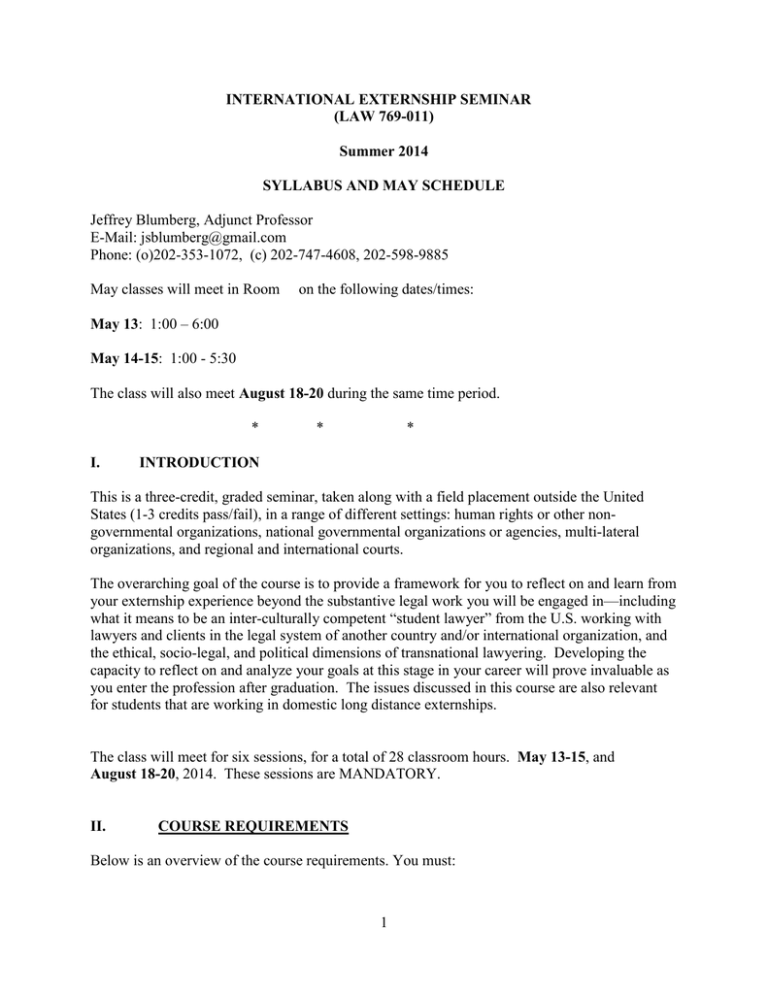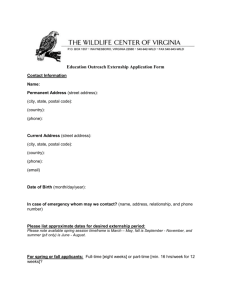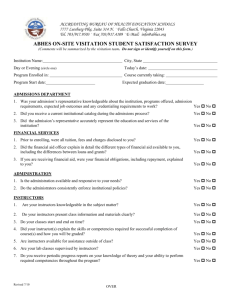DOCX
advertisement

INTERNATIONAL EXTERNSHIP SEMINAR (LAW 769-011) Summer 2014 SYLLABUS AND MAY SCHEDULE Jeffrey Blumberg, Adjunct Professor E-Mail: jsblumberg@gmail.com Phone: (o)202-353-1072, (c) 202-747-4608, 202-598-9885 May classes will meet in Room on the following dates/times: May 13: 1:00 – 6:00 May 14-15: 1:00 - 5:30 The class will also meet August 18-20 during the same time period. * I. * * INTRODUCTION This is a three-credit, graded seminar, taken along with a field placement outside the United States (1-3 credits pass/fail), in a range of different settings: human rights or other nongovernmental organizations, national governmental organizations or agencies, multi-lateral organizations, and regional and international courts. The overarching goal of the course is to provide a framework for you to reflect on and learn from your externship experience beyond the substantive legal work you will be engaged in—including what it means to be an inter-culturally competent “student lawyer” from the U.S. working with lawyers and clients in the legal system of another country and/or international organization, and the ethical, socio-legal, and political dimensions of transnational lawyering. Developing the capacity to reflect on and analyze your goals at this stage in your career will prove invaluable as you enter the profession after graduation. The issues discussed in this course are also relevant for students that are working in domestic long distance externships. The class will meet for six sessions, for a total of 28 classroom hours. May 13-15, and August 18-20, 2014. These sessions are MANDATORY. II. COURSE REQUIREMENTS Below is an overview of the course requirements. You must: 1 1. submit journal entries reflecting on your fieldwork experience on a weekly basis during your placement; 2. deliver class presentations during the May and August classes; 3. Participate in remote class discussions during the semester; 4. attend and participate in the six mandatory class sessions in May and August, read assigned materials (both in May and throughout the summer). Each of these requirements (and the weight I will give them in grading) is described more fully below. Reflective Journal and Weekly Journal Submissions (35% of final grade) You are required to keep a journal throughout the summer as a tool to reflect on and analyze your externship experience, including your work, your workplace, your career goals, ethical issues, and intercultural competency issues that arise over the course of your international placement. From the start of your field placement until its end, for a total of 8 submissions, you must submit a 1-2 page single-spaced journal entry created in a Word document and emailed to me at jsblumberg@gmail.com to be received by me by 5 pm each Sunday, EST time (i.e., my time). You are starting your externships on different dates; but please have your first journal entry to me by 5 pm, Sunday, May 30 even if you’ve only been working a few days by that point. Some of you may be in your placement longer than 8 weeks; if so, please submit journal entries through the Sunday of Week 8. (In other words, you must submit entries on a weekly basis from the first week through the eighth week.) Your journal entries may, of course, contain descriptions and observations, but they also must contain your reflection and/or analysis of the event(s)/work/things/people/ that have been observed and described. Your weekly submissions are confidential and will be read by me only. If you discuss an issue I think may be of interest to the entire class, I will ask your permission before sharing. A few possible topics are listed below simply to get you started thinking. You are encouraged to be creative. the role and mission of the organization; the culture of the office; your supervisor ; questions and concerns about the assignments you are given; transnational lawyering issues (e.g., language, culture, legal norms, ethics, etiquette); communication among the lawyers and between lawyers and clients (keeping in mind your duty to preserve client confidences and workplace rules); 2 management skills (e.g., lawyers spend a lot of time in meetings -- what makes a meeting well run, or not?; do you think your supervisor is an effective manager?); the relationship between the content of this class (discussion and readings) or other courses you’ve taken, and what you are learning in your externship; reflections on what kind of lawyer you aspire to be and what environment you seek to practice in; what have you learned that will help you to make decisions about future employment? Discussion of Hofstede National Culture Dimensions (discussed during May classes): Interactions with cultural informant. Your second journal should discuss either your efforts to develop a “cultural informant” or the interview of a local individual of your choosing. (Will be discussed during the May 13th class). Your fifth journal entry (mid-summer) should refer back to the goals we discussed in our first class, and discuss what progress you have made towards reaching your goals, and what steps you can take to ensure that you reach your goals by the end of your externship. Your seventh journal should discuss several of the Hofstede dimensions for your country. Did you find the Hofstede analysis to be consistent with your experience in your community or workplace? I will reply to your journal e-mail to provide a grade and confirm receipt. If you do not receive a confirmation e-mail, assume I didn’t receive your journal entry and follow up accordingly. I am looking for the quality of your reflection and analysis rather than the quantity of observations. Grading will be “check” (entry completed satisfactorily and on time) or “checkplus” (entry timely completed and also showing special effort or distinctive substance). Journal entries submitted late or showing little effort will receive a score of “check minus.” Your journal submissions should be proofread for errors and they should communicate your thoughts coherently. Be mindful of confidentiality rules contained in the ABA Model Rules (which are incorporated into the WCL Honor Code, which applies to you during your externship), the jurisdiction of your placement, as well as workplace rules when writing your journal entries and discussing work issues in class (e.g., final presentations) or during our on-line class discussions. You can usually preserve client confidentiality by not including case names or client names, and changing details, such as places and organizations. A sample journal entry will be distributed during the first class. 2. Class Presentations (35% of final grade) 3 During the May classes, each student will present on the substantive issues related to their placement. (Attached to syllabus.) During the August classes, each student will make a presentation on a topic that relates in some way to the course, whether general issues of lawyering, transnational lawyering issues, interculutural competence issues or something else of interest from your fieldwork placement. Possible topics are as diverse as your interests and concerns about the law and lawyering inspired by your summer experience. Plan to take 10-15 minutes for your May presentation and 15-20 minutes for your August presentation, including time for discussion. A topic proposal (one paragraph) will be due on July 28, 2014. 3. Discussion Board Postings (10% of final grade) While you are at your field placements, you are required to post once a week to our discussion board/ group skype chat (TBD) either a topic or question you generate, or a response/comment to a classmate’s post. I will also on occasion assign (and post) readings and ask for discussion comments to be posted by a specific deadline. 4. Attendance and Full Participation in all activities (20% of final grade) III. All class members are required to attend all classes in full and are expected to participate actively in the class discussions in the May and August sessions at WCL. Students must attend 75% of the classes in order to receive credit for the course, unless there is good cause for excessive absences, such as illness. (See 2009-10 WCL Catalog, at 46-7.) Tell me in advance if you must be absent during a class in May or August, and provide a reason for your absence. Unexplained absences from class will affect your final grade ADDITIONAL COURSE REQUIREMENTS Take note of other requirements associated with your externship: BY MAY 14, you should have already (1) submitted a “Request for Approval” for your field placement through the Externship Office’s online process; (2) received a PDF add/drop form; (3) obtained the Externship Office’s signature on the add/drop form; and (4) submitted the add/drop form to the Registrar’s office to formally enroll in the fieldwork credits. In other words, you should be signed up for the fieldwork component of this class. If you are not, and your name is not showing on the roster, or the course is not listed on your MyWCL page, please see the Externship Office immediately. You must be registered for, and receive credit for your fieldwork placement (which is graded on a pass/fail basis). Complete a mid-summer evaluation meeting with your field supervisor, which ideally would include a review and discussion of your Goals Memo, and discuss it in a journal entry. 4 Provide me with contact information for your field supervisor—preferably more than one mode of contact (ideally including an email and skype, if possible). Complete an exit interview with your field supervisor. Maintain contemporaneous time sheets and submit them to me at the end of the semester showing hours worked and field placement activities. An hours log form can be found at this link http://www.wcl.american.edu/externship/pub.cfm. Complete end-of-summer evaluation of your field placement and submit on-line. * * * 5 Tentative Schedule TUESDAY, MAY 13: CROSS-CULTURAL LIVING Readings: Mike Tidwell, The Ponds of Kalambayi (1990) (selected pages)(attached to class page.) Guest Speakers: Roundtable of former international externs from Cameroon, Jordan and South Africa. WEDNESDAY, MAY 14: CROSS-CULTURAL LAWYERING Readings: Susan Bryant, The Five Habits: Building Cross-Cultural Competence in Lawyers, 8 CLINICAL L. REV. 33, (2001) (attached to class page.) Guest Speaker: Maha Jweied: Senior Counsel, Access to Justice Initiative, U.S. Department of Justice THURSDAY, MAY 15: YOUR ORGANIZATION Readings: ABA Model Rules of Professional Conduct: Rules 1.3, 1.5, 1.6, 1.7, 3.3, 3.8, 5.2, 5.3, 5.5, 8.3, 8.5. Read Rules and Comments to Rules. http://www.americanbar.org/groups/professional_responsibility/publications/model_rules_of_pro fessional_conduct/model_rules_of_professional_conduct_table_of_contents.html International Bar Association (IBA), International Code of Ethics (2012). (attached to class page.) Guest Speaker: Irfan Saeed, Senior Policy Advisor, Office for Civil Rights and Civil Liberties, Department of Homeland Security 6 In-Class Presentations (May) For the May 15th class, you will be expected to give a brief (approximately 10 minutes) presentation to the rest of the class on your organization and country where you will be externing this summer. International students will present on the following: Country Description (Research your destination country on the Department of State (DOS) International Travel web page; also consult the DOS Country Reports on Human Rights. Feel free to consult additional materials as well.) The basic political/legal/economic systems Ethnic and religious make-up of country; languages spoken Hofstede Dimensions (see http://geert-hofstede.com/countries.html)(Will be Discussed during First Class) Status of women Role of Lawyers What is the role of lawyers in your destination country? How is the legal profession regulated? Is there a code of ethical/professional conduct or a lawyers’ law? If so, are there substantial differences with the Model Rules? How would you describe the legal culture? How independent are lawyers/judges? Are they a political force? Description of Organization Describe your organization structure. What work do they do? What are the organization’s biggest accomplishments? Are there any publicly known concerns about the organization? Safety Issues What should travelers to the country know? What is the crime situation? What are the security issues? How substantial is the terrorist threat? Are special precautions for women advised? Is there a heightened risk for Americans in the country? *****Domestic students will present on “Description of Organization”. In addition, please discuss any unique cultural issues related to the clients you will be serving or the area of the country where you will be working. Finally, discuss in some detail any major cases that your organization has been involved in recently. 7




